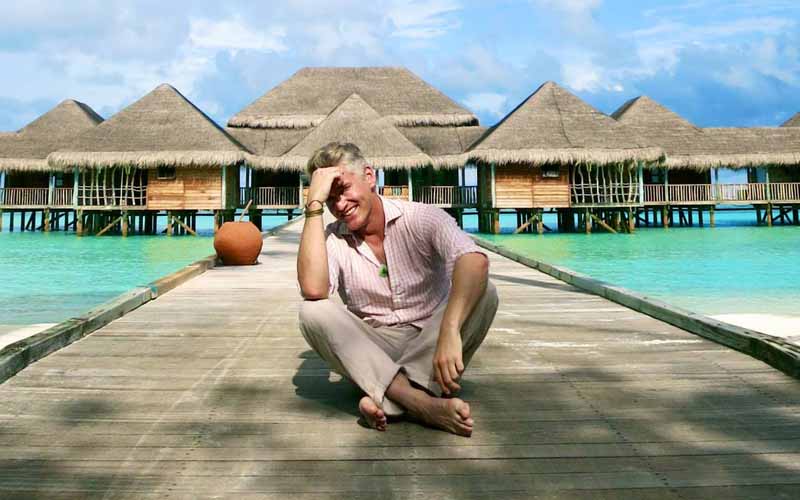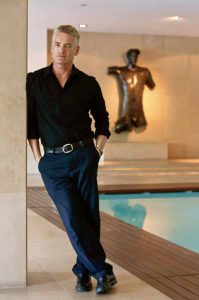
Nigel Franklyn, The Spa Whisperer, has worked with some of the most iconic brands around the world as he helped shape the global luxury wellness industry. He talked with us about the past, present, and future of spa and wellness.
Nigel Franklyn, The Spa Whisperer, has spent his career helping lead the wellness evolution and shape luxury spa and wellness into the global force that it is today. A veteran of the global luxury wellness industry, Mr. Franklyn has worked with some of the most iconic brands around the world, including Four Seasons, George V, Paris, The Siam, Bangkok, Aman Resorts, and Clinique La Prairie.
Hailed as a unique visionary and wellness influencer, Mr. Franklyn is a warm and charismatic personality, so it’s no surprise that he was named Global Wellness Personality in this year’s inaugural Hall of Wellness Awards by Spa Connectors.
We spoke to him about the past, present, and future of the spa and wellness industry, what to look for in a spa therapist, and what he’s excited about.
 Tell us about your career trajectory and how you came to be doing what you are today.
Tell us about your career trajectory and how you came to be doing what you are today.
I went to university in the UK for English and journalism, then went to San Francisco and worked as a journalist. It was a different time, before the spa industry was even a thing. I went to write about the opening of a spa in Atlanta, and while I was there, I had this incredible experience with a therapist named Margaret. I remember everything about it. I remember what she wore, her hair, the tone of her voice… I don’t remember the treatment itself, but I do remember that she made me feel safe and wanted. I was so overwhelmed by that experience that I became a therapist, because I wanted to give that to people. It changed my life, and it changed who I was in my life.
I became a massage therapist and an aesthetician, and then a consultant because I realized that I was one person and I needed an army of therapists around the world ready to make this big romantic difference in the lives of everybody. Working inside spas, developing therapies and therapists, naturally progressed into spa development, wellness concept development, and design. I work primarily now with architects and designers and we build entire wellness concepts. But the core of it always for me is the art of therapy, creating spaces where people can feel safe and wanted. That’s my romantic anchor.
How has your experience in the industry changed since then?
I was fortunate to have been at the forefront of this wellness evolution. I don’t have to convince people or make excuses anymore. Wellness is now a $4.2 or $4.3 trillion industry. It’s three times the size of the pharmaceutical industry. The way I’m able to do my job has changed so much; I have access to everything now, which I never had before. When we first got into developing spas, I was always trying to find space in the laundry rooms in the basements of hotels because nobody believed that spa and wellness was a thing. Now people are asking me to create these transformative, integrative wellness experiences, because everyone has a greater understanding, especially now after this crappy year, of the impact wellness can have on their lives.
What should spa directors look for in a therapist?
Someone who really understands how to deliver wellness. If someone has spark and energy, and the emotional intelligence that creates a human connection, you can teach them anything else they need to learn. Wellness is such a beautiful, amorphous, transformative thing. Your hands don’t make you a therapist. Understanding steps one through six of a massage isn’t as important to me as understanding therapy as a transformative concept.
Look at me. I was a journalist, and now I do this because of Margaret, who I’ll never meet again. I do breathing exercises on planes because, 15 years ago, a therapist in Dubai told me to. I still carry these pieces of information. It’s important to me that therapists understand that they have the power to change somebody’s life.
How has the last year impacted the industry?
In the beginning we were all just responding and worried about immediate necessities, like PPE. Now we are evolving and getting more creative. We’re talking about how technology can influence the wellness journey or spa experience, like contactless check in, air filtration systems, and UV sanitization. Out of crisis comes opportunity, right? The wellness industry is on the precipice, about to jump into something, a greater expansion, a greater universe than it was before.
Wellness has become more accessible to everybody and people are more conscious of it, especially of their self-care. We’ve all been locked away and that isolation, that grief, is what the wellness industry can respond to and is responding to. I think this is a very exciting thing.
Are there any trends or developments you’re excited about?
I don’t like trends. I like shifts. Trends to me are like bamboo massage, while a shift is a change of thinking or focus and something to which we can sustainably respond. As somebody who’s responsible for creating sustainable wellness experiences, it’s important that I focus on what I think has some weight to it. I think mental wellness is going to be a big shift, and now that we’ve all gone through a collective mental health experience, the grief and stress, we can talk about it, whereas we couldn’t before.
Back to technology, I also like that the Global Wellness Summit has been opened up to virtual attendees, because people aren’t travelling, which makes it open to everybody. Anybody can join these wonderful, informative initiatives like the GWS. So, just seeing how technology influences wellness, I think is super exciting.
What are you working on that you’re excited about?
I just teamed with some friends to launch our own sustainable therapeutic line of body products called Moss of the Isles. We use small batch hand harvested ingredients from Ireland and the British Isles. It was something I’ve always wanted to do. We have also created Moss Wellness Consultancy, a collaborative initiative that grew out of our deep-rooted passion for authentic, conscious wellness.
And I have a big project in India called King’s Mansion. It’s a small, luxury wellness resort and the concept mixes Ayurvedic medicine and philosophies with state-of-the-art genomics and treatments like laser light infusions. My passion is combining traditional philosophies like TCM and Ayurvedic medicine with state-of-the-art, evidence-based science. I think moving forward, there will be a shift toward what I call wellness alchemy where we combine one philosophy with another.
It’s time to look into our crystal balls and predict the future for the year ahead. Subscribe to our newsletter and download our special report on the trends we’ll be watching: Nine spa and wellness trends for 2021. Download here.
Spa Executive is published by Book4Time, the leader in guest management, revenue and mobile solutions for the most exclusive spas, hotels, and resorts around the globe. Learn more at book4time.com.




